I Latin American Colloquium on Interprofessional Education and the Training of Health Technicians
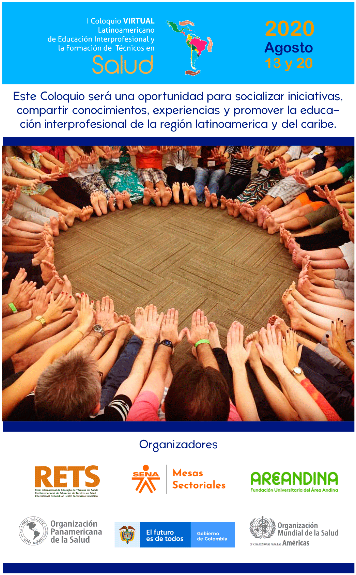 On the 13th and 20th of August, from 4pm to 7pm (Brasilia time), the 1st Latin American Colloquium on Interprofessional Education and the training of Health Technicians was held. The event, which would take place in May in Colombia, ended up taking place digitally, in two sessions, due to the Covid-19 pandemic. The Colloquium, coordinated by the National Apprenticeship Service of Colombia (SENA), through the Mesa Setorial de Serviços de Saúde, and by the Executive Secretariat of the International Health Technicians Education Network (RETS), supported by the Colombian Ministry of Health, the Pan American Health Organization (PAHO / WHO) and the Fundação Universitaria da Área Andina (Areandina).
On the 13th and 20th of August, from 4pm to 7pm (Brasilia time), the 1st Latin American Colloquium on Interprofessional Education and the training of Health Technicians was held. The event, which would take place in May in Colombia, ended up taking place digitally, in two sessions, due to the Covid-19 pandemic. The Colloquium, coordinated by the National Apprenticeship Service of Colombia (SENA), through the Mesa Setorial de Serviços de Saúde, and by the Executive Secretariat of the International Health Technicians Education Network (RETS), supported by the Colombian Ministry of Health, the Pan American Health Organization (PAHO / WHO) and the Fundação Universitaria da Área Andina (Areandina).
The Colloquium, for which almost 1,000 participants from various countries in the region signed up, had the following objectives: socializing initiatives from the Latin American and Caribbean region in interprofessional education (IPE); share knowledge and experiences of incorporating health technicians in the IPE; promote the implementation of national interprofessional education plans (IPE); and making technical education visible and strengthening in the development of the implementation of national IPE plans.
In the first section, specialists from Latin America and the Caribbean presented and discussed the topic. On the second day, 13 papers approved by the evaluation committee were presented.
For Helifrancis Condé Groppo Ruela, coordinator of International Cooperation at the Polytechnic School of Health Joaquim Venâncio (EPSJV / Fiocruz), Executive Secretary of RETS, the meeting achieved the proposed objectives. "The Colloquium made it possible to share experiences from different countries in Latin America, bringing together the discussion of IPE issues and the training and work of health technicians," he said, adding: "For RETS, in addition to the success of the event itself, we can highlight the strengthening of the organizing institutions and the Network itself, due to the shared and collaborative work in the construction of the initiative ".
• Attention! To watch the videos of the sessions, if you do not have a Teams account, click on the event link> watch on the web> participate anonymously
-
Read the Colloquium Proceedings with papers approved for publication (Portuguese/Spanish)
Session 1: Experts emphasize the relevance of the topic
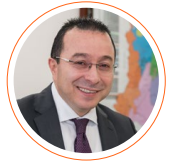 At the opening of the event, the director general of SENA, Carlos Mario Estrada Molina, thanked everyone involved in organizing the colloquium, welcomed those present and highlighted the importance of permanent learning and the need to encourage cooperative work in all areas. areas of knowledge. After Molina's speech, the more than 400 participants watched a brief video (Spanish) with greetings from the Colloquium organizers.
At the opening of the event, the director general of SENA, Carlos Mario Estrada Molina, thanked everyone involved in organizing the colloquium, welcomed those present and highlighted the importance of permanent learning and the need to encourage cooperative work in all areas. areas of knowledge. After Molina's speech, the more than 400 participants watched a brief video (Spanish) with greetings from the Colloquium organizers.
The first day schedule started with the conference 'La incorporación de la Educación Interprofesional en la formación de técnicos en salud, un aporte para el diseño de planes y políticas nacionales de educación y salud´, pgiven by José Rodrígues Freire Filho, representative of the Regional Network of Interprofessional Education of the Americas (REIP). José Rodrigues Freire started his presentation by tracing a brief history of the fundamentals that have been guiding health education through the ages.

Throughout his speech, he returned to the concept of IPE - "Interprofessional Education involves students/professionals from two or more professions who learn together, mainly regarding the role that each one plays, through the interaction between them in a common agenda" - and showed the main strategies necessary for its implementation, always emphasizing the importance of IPE for the strengthening of national health systems, especially with regard to primary care, and the improvement of health care for populations. He also showed the work that RIPE does in stimulating the construction of health IPE policies in the countries that make up the network. Finally, he sought to reflect on the place of technicians in the IPE. "The experiments started in Colombia, Panama, Honduras and the Dominican Republic and show that it is possible to include IPE in the process of training health technicians," he said, stressing that, however, there are still few experiences in the training of these workers.
Finally, he highlighted the role that RETS can assume in the incorporation of IPE in the training of health technicians, with the explicit purpose of improving the quality of care. "It is possible to affirm that collaboration must be present in the interaction between professionals regardless of their level of education, as health work, in essence, is materialized in interpersonal and interprofessional relationships", he concluded.
The program continued with the panel 'Plans and Policies for the Incorporación de la Educación Interprofesional y Educación Técnica en Salud', in which Larisa Carrera, dean of the National University of the Coast (Santa Fé, Argentina) participated; Marcelo Viana da Costa, professor at the Federal University of Rio Grande do Norte (Brazil); Rosa Adelina Cespedes, Academic Director of Health, of the Ministry of Higher Education, Science and Technology of the Dominican Republic; and Gerardo Arturo Medina Rosas, deputy director of SENA and technical secretary of the Sectorial Bureau of Health Services in Colombia. The final comments were made by Helifrancis Condé, who summarized the panel's presentations, seeking to reflect on the challenges of the health sector for incorporating Interprofessional Education in the training of its workers.
 Larisa Carrera, who brought Argentina's experience in this area, started her presentation explaining that technical training in health in the country takes place on very diverse training trajectories, so much so that it refers to learning experiences and the context in which they develop. In this sense, there are technicians with different levels of education, with different degrees, although higher education, including university level, prevails. She presented three types of IPE experiences that are being carried out by the Faculty of Medical Sciences UNL: those focused on working with the community, those of simulation and those that are within the framework of the pandemic for interprofessional teams. The latter aim to contribute to the care of the health team and start from the premise that these teams are facing a significant increase in the demand for care, with the consequent physical and mental overload of workers, added to a greater risk of contracting the infection. She also presented studies that indicate simulation as a privileged tool in times of pandemic.
Larisa Carrera, who brought Argentina's experience in this area, started her presentation explaining that technical training in health in the country takes place on very diverse training trajectories, so much so that it refers to learning experiences and the context in which they develop. In this sense, there are technicians with different levels of education, with different degrees, although higher education, including university level, prevails. She presented three types of IPE experiences that are being carried out by the Faculty of Medical Sciences UNL: those focused on working with the community, those of simulation and those that are within the framework of the pandemic for interprofessional teams. The latter aim to contribute to the care of the health team and start from the premise that these teams are facing a significant increase in the demand for care, with the consequent physical and mental overload of workers, added to a greater risk of contracting the infection. She also presented studies that indicate simulation as a privileged tool in times of pandemic.
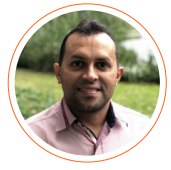 Marcelo Viana, one of the main Brazilian specialists in IPE, spoke about the challenges of incorporating this strategy for the training of mid-level technical workers. According to him, the logic of training these workers and the strong technical division of health work end up creating a dichotomy between manual work and intellectual work, which results in the low participation of middle-level technical workers in decision-making processes. He stressed that health work materializes in an environment of constant interaction between different professionals in the area, but that most professionals have limited knowledge about the complexity of collaboration, which arises in opposition to traditional competition. In this sense, he presented the collaborative skills necessary to change the paradigm and how much this can result in improvements in health care.
Marcelo Viana, one of the main Brazilian specialists in IPE, spoke about the challenges of incorporating this strategy for the training of mid-level technical workers. According to him, the logic of training these workers and the strong technical division of health work end up creating a dichotomy between manual work and intellectual work, which results in the low participation of middle-level technical workers in decision-making processes. He stressed that health work materializes in an environment of constant interaction between different professionals in the area, but that most professionals have limited knowledge about the complexity of collaboration, which arises in opposition to traditional competition. In this sense, he presented the collaborative skills necessary to change the paradigm and how much this can result in improvements in health care.
As difficulties for the development of IPE, he highlighted the fragmented hospital routines, almost always out of line with what is attempted during the training of workers, and some stereotypes of professional behaviors that generate prejudice and oppose the message about the importance of collaborative interprofessional work. Regarding the insertion of IPE in the training of mid-level technicians, he cites some important steps, which involve: identifying mechanisms for the adoption of IPE in curricula and approaches to effectively train workers with collaborative skills; explore approaches to incorporate interprofessional practice as a central component of health work; review existing IPE initiatives to identify the effects and possibilities to be incorporated; design and implement research to build evidence and identify possibilities in the adoption of IPE; and to value teacher development initiatives to promote interprofessional teaching and learning, as well as to strengthen interprofessional education.
 Sharing the advances in the implementation of IPE in Health in the Dominican Republic was Rosa Cespedes' goal. According to Rosa, the incorporation of IPE in health education is directly related to the commitments assumed by the country with the goals proposed by PAHO / WHO in relation to human resources in health. Among other things, an Action Plan for Interprofessional Education was defined and a diagnosis of the situation of IPE in Higher Education institutions was carried out. In addition, the Guide for implementing IPE activities in higher education institutions was prepared.
Sharing the advances in the implementation of IPE in Health in the Dominican Republic was Rosa Cespedes' goal. According to Rosa, the incorporation of IPE in health education is directly related to the commitments assumed by the country with the goals proposed by PAHO / WHO in relation to human resources in health. Among other things, an Action Plan for Interprofessional Education was defined and a diagnosis of the situation of IPE in Higher Education institutions was carried out. In addition, the Guide for implementing IPE activities in higher education institutions was prepared.
According to her, the diagnosis sought to identify the IPE initiatives, within the health curriculum offer of higher education institutions and allowed to identify the universities that could participate in the initiative. Rosa made recommendations to move forward with IPE as a strategy in the training processes and listed the main challenges that must be faced, such as sensitizing the new authorities on the importance and commitment to promote IPE; update the plan, adjusting it to new contexts; insert the IPE theme clearly in the training and accreditation standards for careers in the health area; and evaluate the virtual environments and methodologies that are efficient for the practice of IPE. With regard to technical professional education, she stressed the need to strengthen training programs with the integration of IPE at various levels, as a strategy to strengthen health teams.
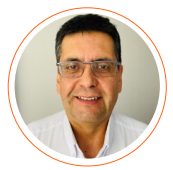
Gerardo Medina started his presentation showing the importance that SENA has in the context of technical training in Colombia. According to him, the institution, which is present throughout the national territory and impacts the lives of seven million Colombians annually, leads the tasks of generating, appropriating and disseminating knowledge to the country's productive sectors; interacts with management entities, resource administration, service provision, input manufacturing and scientific and technological research; promotes employability, innovation, efficiency, competitiveness, productivity and sustainable development; and responds to the needs of the environment with flexibility, opportunity, quality and relevance. In a concise way, Medina also provided an overview of the training of technicians and technologists, who represent 47% of the sector's workforce, and of IPE elements in Colombia.
According to Medina, the functional and organizational concept of a multidisciplinary health team, which aims at a high level of resolution in primary services, management and coordinated access to all other services, including medium and high complexity services, equally, the role of specialists, professionals, technicians and technologists trained in the approach to family and community health, to respond at the primary level for the implementation and articulation of different policy approaches. According to him, the definition of a multidisciplinary team justifies, by itself, the incorporation of IPE in the training of technicians working in the sector. As elements of PPE in Colombia, he highlighted: person-centered education, competence approach, interaction of processes between academic programs, recognition of functions, teacher training and inclusion of IPE in continuing education and in national policies, among others.
As the main challenges to be overcome, he cited the articulation of bodies and decision-making mechanisms for skills, professionals and work; agreement between professions and occupations (unions, associations, government entities, training institutions); integration between technicians and professionals in team discussions; construction of curricula and teaching strategies for team learning; and formulation of National Qualifications Frameworks.
 Ending session 1 (08/13), Helifrancis Condé highlighted the complementarity of previous presentations to understand the theme and the fundamental role of PAHO / WHO in promoting IPE. He also recognized the important work the Organization has been doing in these pandemic times when a few countries are challenging the leadership capacity of global health agencies. In addition, he stressed that many of the processes of change in health education undergo advances in the training of teachers, but that, unfortunately, there is still a lack of more comprehensive and structured policies and initiatives in this area. Responding to a provocative question from Jose Rodrigues' conference on the place of health technicians in the IPE, Helifrancis was emphatic: "The insertion of these workers must and needs to be coordinated with opportunities for critical and quality training".
Ending session 1 (08/13), Helifrancis Condé highlighted the complementarity of previous presentations to understand the theme and the fundamental role of PAHO / WHO in promoting IPE. He also recognized the important work the Organization has been doing in these pandemic times when a few countries are challenging the leadership capacity of global health agencies. In addition, he stressed that many of the processes of change in health education undergo advances in the training of teachers, but that, unfortunately, there is still a lack of more comprehensive and structured policies and initiatives in this area. Responding to a provocative question from Jose Rodrigues' conference on the place of health technicians in the IPE, Helifrancis was emphatic: "The insertion of these workers must and needs to be coordinated with opportunities for critical and quality training".
Session 2: Conferences and papers show experiences and point out great challenges
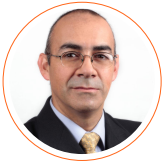
The agenda for August 20, which was opened by Carlos Eduardo Jurado Moncayo, executive director of the Sectorial Chamber of the National Association of Entrepreneurs of Colombia (ANDI) and president of the Sectorial Bureau of Health Services, included two conferences and a presentation of 13 papers that addressed different aspects of IPE. After welcoming everyone, Carlos Moncayo stressed that the moment we are living in makes the need for interdisciplinary, interinstitutional and intersectoral work very clear. "We have to work together", he emphasized.
 Adriana Lucia Dueñas Garzón, instructor and researcher at the Human Talent in Health Training Center (CFTHS / SENA), was responsible for the first conference of the day: 'Educación Interprofesional: Retos en la formación de técnicos en salud'. Adriana emphasized the great interest that IPE has been arousing in the scientific community and presented some results of the research and innovation project, whose objective was to develop a proposal that facilitates interprofessional education at CFTHS based on a didactic strategy. The project started with a state-of-the-art review that analyzed 66 articles on the topic and gave rise to a matrix with the 14 main teaching strategies that have been used. Currently, the research group is developing a pilot project that will be implemented in November this year and that has the course 'Educación Interprofesional en Salud' (AVASUS-UFRN) as a reference.
Adriana Lucia Dueñas Garzón, instructor and researcher at the Human Talent in Health Training Center (CFTHS / SENA), was responsible for the first conference of the day: 'Educación Interprofesional: Retos en la formación de técnicos en salud'. Adriana emphasized the great interest that IPE has been arousing in the scientific community and presented some results of the research and innovation project, whose objective was to develop a proposal that facilitates interprofessional education at CFTHS based on a didactic strategy. The project started with a state-of-the-art review that analyzed 66 articles on the topic and gave rise to a matrix with the 14 main teaching strategies that have been used. Currently, the research group is developing a pilot project that will be implemented in November this year and that has the course 'Educación Interprofesional en Salud' (AVASUS-UFRN) as a reference.
According to her, the project starts from the concept of Integral Professional Training, a theoretical-practical educational process that is based on the development of technical, technological knowledge, attitudes and values for human development and social coexistence, allowing the person to act in a critical and creative in productive and social contexts, that is, in the world of life. "This process is based on knowing how to know, knowing how to do and knowing how to be, which is the essence of the integrality of professional training and allows students to grow as people, citizens and workers", he explained. According to Adriana, the proposed curriculum design is based on the acquisition of specific, transversal and key skills, and the training is done through projects. She stressed that collaborative work in multiprofessional teams is based on the idea of interdependence and presupposes the reduction of power relations between different professions. At the end of her presentation, she reaffirmed the training of instructors as fundamental to the success of the initiative, pointing out the need for training these instructors in the methodological theories of IPE, in order to streamline the process of implementing the initiative in the CFTHS, and be a reference for other technical institutions at national level.
 At the second conference of the day, the coordinator of the Interprofessional Health Education Strategy at Santander University for the Americas (Colombia), Piedad Cecilia Serpa, presented the Experiência da Rede Acadêmica para a Educação Interprofissional (UNIREDE EIP), formalized in November 2019, with the motto 'Together transforming training and performance in health'. UNIREDE is a network formed by higher education institutions from Latin America and the Caribbean, interested in contributing to the development and sustainability of interprofessional education and collaborative practice (IPE and CP), sharing experiences and carrying out joint activities aimed at promoting their strengthening in institutional, national and regional levels.
At the second conference of the day, the coordinator of the Interprofessional Health Education Strategy at Santander University for the Americas (Colombia), Piedad Cecilia Serpa, presented the Experiência da Rede Acadêmica para a Educação Interprofissional (UNIREDE EIP), formalized in November 2019, with the motto 'Together transforming training and performance in health'. UNIREDE is a network formed by higher education institutions from Latin America and the Caribbean, interested in contributing to the development and sustainability of interprofessional education and collaborative practice (IPE and CP), sharing experiences and carrying out joint activities aimed at promoting their strengthening in institutional, national and regional levels.
The fact that almost 30% of the Universities that make up the network also offer technical training at a higher level represents, according to Piedad, a great potential for the development of wider experiences of interprofessional training. UNIREDE's work is carried out through four commissions: the curriculum, the training of trainers, the research and the visibility. "In the case of the Curricular Committee, one of the great challenges is related to overcoming the debate between the multidisciplinary, interdisciplinary, transdisciplinary and, finally, interprofessional concepts, understanding that interprofessionality transcends the disciplinary issue and focuses on people's health care, families and communities ", he explained.
How to take IPE to training processes? According to her, PE learning takes place through didactic practices (classroom), experiences in the community, experiences in assistance services and simulation processes, in specific projects or across the existing courses. "The important thing is to ensure that these practices allow the active participation (of interaction) by two or more members of a health team that participates in the assessment or management of the patient, family or community; that it is a process of learning and experiential socialization; process in which participants learn from, from and about others, both within and between disciplines, through experience itself; that are andragogical, non-hierarchical and decentralized experiences; that focus on the best possible outcome for the patient; and that it be a process of exchange of knowledge and values ", he clarified. She also presented results of some student perception studies about IPE and concluded by pointing out that IPE implementation is gradual and its results are long term.

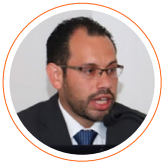 The program was followed by the work session 'Incorporation of health technicians in the IPE processes', mediated by the professor and researcher at EPSJV / Fiocruz and the Federal Fluminense University (UFF) Letícia Batista - Brazil - and by the researcher at IPE in Health and professor at the Antonio Nariño University - Colombia Edgardo Ortega.
The program was followed by the work session 'Incorporation of health technicians in the IPE processes', mediated by the professor and researcher at EPSJV / Fiocruz and the Federal Fluminense University (UFF) Letícia Batista - Brazil - and by the researcher at IPE in Health and professor at the Antonio Nariño University - Colombia Edgardo Ortega.
In their comments, the mediators sought to highlight the main points of each work, among which: teacher training as one of the cornerstones for the incorporation of IPE in health training processes; the role of IPE in promoting health in communities and building common knowledge; the possibility that IPE brings to break barriers between professionals with different levels of education in the search for better care for users of the health system; the importance of research with graduates to understand the course of training and the relevance of postgraduate residences for health work; the recognition of the work of technicians in health teams and work spaces as training niches; the Brazilian experience of the Education through Work for Health Program (PET-Saúde / Interprofessionality) with regard to IPE for undergraduate students; intersectoral articulation, innovation, adaptability, dependent context and multidisciplinary teams, as fundamental elements for IPE and collaborative practice; the need to think about appropriate methodologies for incorporating IPE, among which, the problematization methodology, which starts from reality, problematizes this reality, theorizes about it and proposes solutions to problems; IPE in fragmented training scenarios, the regulation of competences at different levels of training and paths of articulation between these different levels; the Nuclei of Permanent Education in Health as a way to materialize the Brazilian education policy for workers who are already working in health services; IPE and the challenge of popular participation in the elaboration and consolidation of public health and education policies; the importance of policy induction by the State or institutions to strengthen the IPE; and the hierarchy of knowledge as an obstacle to collaborative work and interprofessional practices.
Finally, Edgardo reiterated that the works presented helped to fulfill the objectives of the Colloquium. For him, there was no doubt that all the works helped to motivate discussions and reflections regarding the different paths to follow, considering the national specificities and the possibilities of working together. Letícia, in turn, observed that there is no need for a new professional profile for integrated work, but for the adequacy of the profiles that already exist for this new way of acting.
Presented works (Portuguese and Spanish)
Rol del docente en la formación del talento humano en salud desde la perspectiva de educación profesionalPaola Ruiz Díaz (Areandina - Colômbia) |
Intersecções entre a interprofissionalidade e a formação em saúde: análises de uma experiência brasileiraDavid Ramos da Silva Rios (UFBA-Brasil) |
La atención en salud basada en el valor desde el aporte del técnico en administración en salud en Unipanamericana CompensarJohn Fredy Barrero Romero (Colômbia - Unipanamericana) |
Percepção de egressos dos programas de residência em área profissional da saúde da Secretaria de Estado da saúde de GoiásRosana Mendes Reis Barbosa (SES/GO - Brasil) |
Modelo de gestión del cuidado, consultorio de enfermería, Clínica de Heridas GiraldoLuis Fernando Giraldo Giraldo (Clínica de Heridas Giraldo - Colômbia) |
Educação interprofissional em saúde e práticas colaborativas: promovendo o trabalho em equipeManuela Valverde Fernandes (UEFS - Brasil) |
Experiencia SENA de Formación de Técnicos en Salud como Educación InterprofesionalNora Luz Salazar Marulanda (SENA - Colômbia) |
Metodologia da problematização como abordagem da educação interprofissional: experiência de uma décadaEllen Rose Sousa Santos (ESP/MA - Brasil) |
Asistente especializado en cuidados personales: una oportunidad para promover derechos a través de la regulación de formación técnica.Isabel Duré (Ministerio de Salud de la Nación - Argentina) |
Fortalecimento da educação permanente em saúde como estratégia para o desenvolvimento de práticas colaborativas.Jacyane Ramos de Sousa (ESP/MA - Brasil) |
Práticas educativas no processo formativo da enfermagem em hospital de ensino na região centro-oeste do BrasilGabriela Lima Gonçalves (Brasil) |
Projeto educação interprofissional em saúde – política indutora de mudanças na universidade e na prática da saúde públicaAmanda Lagreca Venys (Secretaria Municipal de Saúde de São Paulo - Coordenadoria Regional de Saúde Oeste - Brasil) |
Práticas de educação em saúde e a promoção da educação interprofissional na atenção primáriaPriscila Alves Torreão (UEFS - Brasil) |
Read the Colloquium Proceedings with papers approved for publication (Portuguese/Spanish) |
Background
Across the world and, specifically, in the region of the Americas, Interprofessional Health Education (EIP) has become a trend in the management and training processes of health workers. As part of the responses generated to manage crises in the health and education systems, EIP promotes participation in the training and health care processes of students and teachers from different academic programs. The available experiences show that teamwork enhances the skills, quality, and relevance of health interactions. In this sense, various international and sub-regional organizations have promoted the implementation of national plans that guide the development of policies that favor the transversal implementation of the IPE approach, as well as the development of experiences that generate collaborative learning and knowledge management exercises.
EIP is characterized, among other aspects, by the intersectoral articulation, by the allocation of specific populations and territories as axes of teamwork, by the innovation and expansion of roles, and by the strengthening of transversal competencies through various educational activities with a critical approach.
In the region of the Americas, PAHO/WHO, with the participation of the Ministries of Health and Education, actors in the health and education systems, has promoted the participatory design and implementation of these national plans, a process that has already resulted in three meetings of the Regional Interprofessional Education Network of the Americas (REIP) and various inputs.
The advances make it possible to identify important developments in the activities of characterization, training of trainers, curricular transformation, policy design, among others, which have focused mainly on the participation of health professionals.
In the scope of teamwork, health technicians and technologists (considering the different names that these profiles may have in countries) are protagonists of health actions, both for family and community ties to strengthen the social relevance of tension and for availability in territories where health services do not have other professional profiles.
The International Health Technicians Education Network (RETS), whose executive secretariat is carried out by the Joaquim Venâncio Polytechnic School of Health of the Oswaldo Cruz Foundation - Brazil (EPSJV-Fiocruz), is an articulation between institutions and organizations involved in training and technical qualification of health personnel in Portuguese-speaking countries in the Americas in Africa and Portugal. Its mission is to strengthen national health systems, based on the assumption that the qualification of workers is a fundamental dimension for the implementation of public health policies that meet the needs of the populations. Within the scope of RETS, technical health work is understood to be all work carried out by the group of workers who carry out technical-scientific activities in the sector and includes activities carried out by assistants and community health agents, including those carried out. by top-level technicians.
On November 12, 13, and 14, 2018, the 4th RETS General Meeting was held in Rio de Janeiro, which included the International Seminar “The 40 years of Alma-Ata and the role of health technicians in carrying out the universal health systems ”. At the time, about 40 institutional representatives evaluated the work carried out over the years and, among other things, prepared the network's work plan for the period 2019-2022.
Among the topics of interest to RETS members, especially those from Latin America, interprofessional education stood out. While recognizing the relevance of the theme for the establishment of collaborative health practices, especially in the field of Primary Health Care (PHC), it is essential to recognize that little is known about the interfaces of this theme with education and work health technicians, since most publications and experiences on the subject tend to be related to university training courses. A context of theoretical and practical gaps that justifies, in the case of RETS, the necessary construction of efforts to overcome them.
In this sense, the RETS 2019-2022 Work Plan included a specific item on interprofessional education and the training and work of health technicians. The idea is that it is essential to strengthening the role of technicians and technologists in the national IPE plans for the region of the Americas, including the incorporation of the interprofessional approach in educational programs and the recognition of their contribution to health care.
In this context, the proposal to hold this event is approved, with the participation and support of PAHO/WHO, RETS, SENA, the Ministries of Health and Education, and various training institutions, to show the progress and challenges the incorporation of health technicians in the EIP processes; in the training of health technicians with an interprofessional focus; and the incorporation of health technicians in the formulation of national plans and policies for IPE, education, and health.
